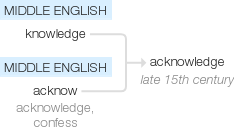Acknowledge
late 15th century: from the obsolete Middle English verb knowledge, influenced by obsolete acknow ‘acknowledge, confess’.
wiktionary
Recorded since 1553, a blend of Middle English knowlechen(“to discover, reveal, acknowledge”) and aknowen(“to recognize, acknowledge”); the latter from Old English oncnāwan, ācnāwan(“to know, recognize, acknowledge”), from on + cnāwan(“to know”). Notice the preservation of /k/ word-internally (regularly spelled with ck as in back) while being lost word-initially. The prefix might have been influenced by Anglo-Norman a-(“on-, to-”). See knowledge.
For the formation compare Latin agnōscō and Russian призна́ть(priznátʹ), with cognate roots.
etymonline
acknowledge (v.)
late 15c., "admit or show one's knowledge," a blend of Middle English aknow "admit or show one's knowledge" (from Old English oncnawan "understand, come to recognize," from on (see on (prep.)) + cnawan "recognize;" see know) and Middle English knowlechen "admit, acknowledge" (c. 1200; see knowledge). "By 16th c. the earlier vbs. knowledge and a(c)know ... were obs., and acknowledge took their place" [OED].
In the merger, an unetymological -c- slipped in; perhaps the explanation is that when English kn- became a simple "n" sound, the -c- stepped up to preserve, in this word, the ancient "kn-" sound. Related: Acknowledged; acknowledging.
